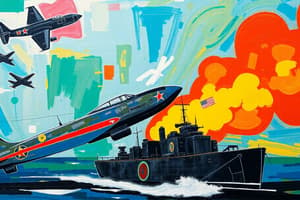Podcast
Questions and Answers
What event in US history led to the country's involvement in World War II?
What event in US history led to the country's involvement in World War II?
- Attack on Pearl Harbor (correct)
- The Battle of Midway
- The Battle of Guadalcanal
- The Bombing of Hiroshima
Which American naval base was attacked by Japanese warplanes in December 1941?
Which American naval base was attacked by Japanese warplanes in December 1941?
- Wake Island
- Guam
- Pearl Harbor, Hawaii (correct)
- Mariana Islands
How many military personnel and civilians died as a result of the attack on Pearl Harbor?
How many military personnel and civilians died as a result of the attack on Pearl Harbor?
- Over 2,300 (correct)
- Around 1,000
- Less than 500
- More than 5,000
Which battle is known for being a turning point in the Pacific War during World War II?
Which battle is known for being a turning point in the Pacific War during World War II?
Which of the following regions was NOT part of the Pacific War theater during World War II?
Which of the following regions was NOT part of the Pacific War theater during World War II?
What effect did the attack on Pearl Harbor have on US involvement in World War II?
What effect did the attack on Pearl Harbor have on US involvement in World War II?
Which countries' navies fought alongside the US Navy in the Pacific War?
Which countries' navies fought alongside the US Navy in the Pacific War?
What measures did the American government introduce on the homefront during World War II?
What measures did the American government introduce on the homefront during World War II?
Which cities became centers of production during World War II in the US?
Which cities became centers of production during World War II in the US?
How did Americans support the war effort on the homefront?
How did Americans support the war effort on the homefront?
What were some forms of media used to promote war bond drives on the American homefront?
What were some forms of media used to promote war bond drives on the American homefront?
Flashcards are hidden until you start studying
Study Notes
World War II in US History
Pearl Harbor
On a sunny Sunday morning in December 1941, the United States was thrust into a global conflict when Japanese warplanes attacked the American naval base at Pearl Harbor, Hawaii. The surprise attack caught the military off guard, causing significant damage to the USS Arizona, USS Oklahoma, USS California, USS West Virginia, USS Utah, USS Nevada, and USS Maryland, along with dozens of other vessels and hundreds of aircraft. The attack resulted in the deaths of over 2,300 military personnel and civilians, with thousands more injured.
The United States declared war on Japan the following day, effectively entering World War II. The attack on Pearl Harbor not only served as a catalyst for American involvement but also as a rallying cry that united the nation behind the cause of defeating fascism.
War in the Pacific
After the attack on Pearl Harbor, the United States and its allies focused much of their efforts on the Pacific War, which primarily involved conflicts in the Pacific "Ring of Fire." This vast expanse of ocean included several strategic regions such as the Central Pacific, the South Pacific, and the China-Burma-India theater.
The Pacific War was marked by fierce fighting on land, sea, and air, including iconic battles like the Battle of Midway and the Battle of Guadalcanal. The US Pacific Fleet, under the command of Admiral Chester Nimitz, played a pivotal role in turning the tide of the war, eventually leading to the eventual defeat of the Japanese Imperial Army.
The Pacific War required an enormous effort, with the US Navy, Army, and Marine Corps fighting alongside the Royal Navy, Royal Australian Navy, Royal New Zealand Navy, and other Allied forces. The war was a monumental struggle, with each side suffering heavy losses and experiencing moments of both triumph and tragedy.
Homefront
While the fighting raged in Europe and the Pacific, the American homefront also played a crucial role in the war effort. Citizens from all walks of life joined together to support the war, with millions of men and women serving in the military, and others working in factories to produce weapons, machinery, and other essential items.
The government implemented policies like rationing, wage and price controls, and the draft to mobilize resources and people for the war effort. Cities like Detroit, Chicago, and Pittsburgh became centers of production, with factories producing everything from ships and planes to tanks and weapons.
The homefront also experienced changes in culture, as Americans turned to patriotism to unite the nation. Radio, cinema, and print media all played a role in promoting war bond drives, selling war stamps, and educating Americans about the war effort.
World War II in US history is marked by a period of massive change, as the country mobilized its resources and people to fight against fascism. From the shock of the attack on Pearl Harbor to the triumph of the Pacific War, and the transformative impact on the American homefront, the war left a lasting impression on the nation, shaping the course of history for decades to come.
References:
- World War II in US History, The National WWII Museum, retrieved from https://www.nationalww2museum.org/war/world-war-ii-us-history, accessed on February 22, 2024.
Studying That Suits You
Use AI to generate personalized quizzes and flashcards to suit your learning preferences.




